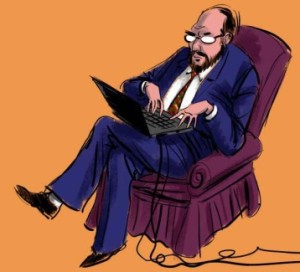Yesterday, Joe discussed knowing where you’re headed before getting started. I received an email from a college friend this week who’s writing his first novel, and he asked me a few questions about my process. I thought I’d share some of what I said in reply. Of course, there is no one “right way” to write a book; everyone has to find his or her own path. But after hammering out four books, I’ve learned what works for me.
novel, and he asked me a few questions about my process. I thought I’d share some of what I said in reply. Of course, there is no one “right way” to write a book; everyone has to find his or her own path. But after hammering out four books, I’ve learned what works for me.
1) At what point do you seek formal feedback, rather than just cranking it out?
I don’t show my work to anyone until I’ve completed two drafts. And then I send it to my “Beta readers,” 5-7 people whose opinion I trust. What I’ve discovered, however, is that they’ll all like different aspects of the story, and they’ll all criticize different aspects. I always take that feedback with a grain of salt. If more than one person is saying the same thing, I know it’s time to go back and figure out where I went wrong.
In Boneyard, one of my readers was so taken with a character in the initial chapter, she felt strongly he should be incorporated into the rest of the storyline. I had fleshed out that character fairly well, so that when something happened to him, you’d fear for his well-being. But ultimately, he was a device to kickstart the plot. Think of it as the garbage men who find a body in a dumpster in the first five minutes of Law and Order. You don’t expect to see the garbage men help track down the killers, or try the accused–they’re there to find the body, then they’re gone. Same with this character. No one else had that comment, so I chose to limit him to that opening chapter.
2) Do you counsel quantity (ie, getting more on paper) over quality (tweaking sentences) early on?
In my opinion what separates published authors from people who have been working on a book for years without completing it is this: never look back. I don’t start editing–at all–until the entire book is written. A lot of people get fifty pages in, then go back and start editing chapter one. The danger in this is that while you might end up with a perfect first fifty pages, by the time you finish those there’s a good chance you’ve lost the thread of the story.
It’s also discouraging to suddenly realize you’ve spent three months on fifty pages, and another three hundred and fifty remain to be written (of course, that’s discouraging whether you’ve stopped or not–I call it the “interminable middle”). I never even re-read what I’ve written until I’ve finished the first draft. (I also spend most of that draft thinking that what I’m writing is the worst junk ever committed to page. But I forge ahead, because I know the next draft will be better.) And then when I do go back, the bones of the story are in place.
3) When does it help to have a literary guide (agent? editor? coach?)? How do you get a good one to take you seriously?
Start the agent search only when your manuscript is as absolutely perfect as it’s ever going to be. That means a minimum of three drafts. And after completing each draft, put it away for a month before looking at it again. That gives you a fresh perspective.
Resign yourself to the fact that the agent search might take months- not always the case, but frequently enough that it’s good to be prepared for it. And not hearing back right away doesn’t necessarily mean you’re going to be rejected. My first agent asked for an exclusive on the full manuscript right away–then three months passed. If I had to do it over, I’d probably call after a month and ask if it was all right for me to submit to other agents. In the end it worked out for me, but I was gnawing my nails to the quick that entire time. A month is more than enough time for an agent to have an exclusive.
Begin by querying your 3-5 top choice agents, always making sure that a) they’re currently acquiring manuscripts, and b) they represent the kind of work you write (these seem like givens, but you’d be surprised). There are a lot of good books on querying an agent (my favorite is Noah Lukeman’s “The First Five Pages”). Your query letter needs to be perfect, as do your first five pages, since that’s what an agent reads to make a snap judgement on your work. I loved what people were saying yesterday about switching the second chapter with the first. About a year ago, I read a tremendous manuscript written by a friend. And the entire first chapter I was yawning-not good for a thriller. It was all back story: how the protagonist got his job, where he went to school, his mother’s medical condition…then, scene two kicked in. The main character picked up a woman home at a bar, was accosted in his apartment by Russian mobsters, was threatened with blackmail and suddenly boom- we were off and running. Telling too much at the outset is a common mistake. Bear in mind you have 100,000 words to develop your characters, so there’s no need to overdo it at the outset. (By the way, this excellent book- FREEFALL, by Reece Hirsch- found representation and will be published next year).
Your agent shops the manuscript to editors. Very few publishers accept unsolicited manuscripts these days.
Getting an agent is hard. My best advice would be to go to a writing conference that good agents are attending- a face to face meeting goes a long way toward getting you out of the slush pile. Incidentally, Thrillerfest is hands down one of the best for finding an agent for a thriller- I can’t think of another conference that gathers forty top agents in one place to hear pitches. Well worth the investment if your manuscript is ready.
4) Not a question but an observation — I can’t seem to help harvesting the real lives and personalities of friends and acquaintances. Ringing in my ears is Elizabeth Gilbert: “Tell the truth. Tell the truth. Tell the truth.”
I suppose my personal life infiltrates the storylines in some places–but it depends on what I’m writing. For the screenplay I’m working on right now, my co-writer and I are drawing heavily on our life experiences. But for my series, much of it is pure creation-I’ve never defused a dirty bomb, chased down a suspect, or done many of the other things my characters do. I just imagine what it would be like, basing it on research and discussions with people who do those sorts of things for a living. So the old, “write what you know” has never been something I strongly adhered to. Otherwise I’d write about sitting alone in a room typing day after day. And trust me, that is rarely exciting.





